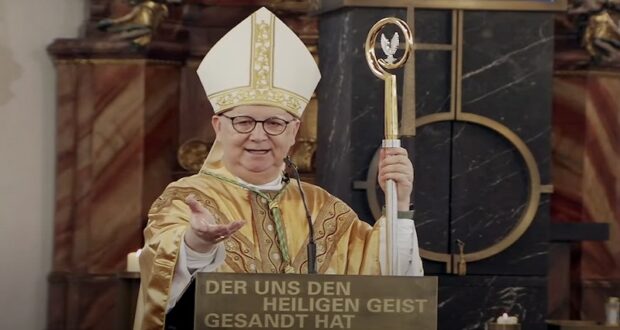البركات بدون التصرف الداخلي الصحيح للمتلقي تكون غير فعالة.. لا توجد بركة من الدرجة الأولى (الليتورجية) أو من الدرجة الثانية (العفوية) من قبل الكهنة.
Andreas Wailzer– “يظل الأمر كذلك أنه لا يمكن مباركة الممارسات الخاطئة والاتحاد غيرالطبيعي لأنها تتعارض مع نظام الخلق وإرادة الله، وفي مثل هذه الحالة، لا يمكن منح البركة أو تلقيها بشكل مثمر،” يكتب الأسقف.
استجاب الأسقف ماريان إليجانتي لإعلان Fiducia supplicans من خلال شرح الأسباب التي تمنع مباركة الأزواج المثليين.
“إن ما يُعرض سمى بسلطة تعليمية، والتي يتم تقديمها كشيء جديد وغير مسبوق على النقيض من التقاليد، هي عبارة مفاهيمية جديدة لا معنى لها من قبل الكاردينال فرنانديز، لأن الباباوات، مثل الأساقفة، هم أوصياء على تعاليم الكنيسة وتقاليدها المتواصلة”. كتب في مقال نشره kath.net.
“الحقائق أبدية ولا تتغير مع روح العصر. بمعنى آخر، لا يأتي الباباوات والأساقفة بأي شيء خاص بهم، بل يفسرون إيمان الكنيسة الثابت على غرار التقليد دون الانفصال عنه.
“لذا يبقى أن الممارسة الخاطئة والاتحاد لا يمكن مباركتهما لأنه يتعارض مع نظام الخليقة وإرادة الله، وفي مثل هذه الحالة، لا يمكن إعطاء البركة أو الحصول عليها بشكل مثمر (راجع التبرير في رد مجمع عقيدة الإيمان على مباركة اتحادات الأشخاص من نفس الجنس اعتبارًا من عام 2021 بموجب بطاقة لاداريا).” Responsum ad dubium
وقال الأسقف المساعد السابق لخور: “لقد علمت الكنيسة هذا دائمًا”.
وأوضح إليجانتي أن البركة هي أمر مقدس، وبالتالي فهي صالحة فقط إذا كان لدى المتلقي والمسؤول التصرف المناسب. وهو يختلف عن الأسرار السبعة، التي تكون دائمًا صالحة بشكل مستقل عن معتقدات الفرد الداخلية.
وقال الأسقف السويسري: “إن البركات بدون التصرف الداخلي الصحيح للمدير والمتلقي تكون غير فعالة لأن البركات لا تعمل من العمل المنجز مثل الأسرار”.
“إنها أسرار مقدسة. ولا يوجد فهم جديد وموسع في هذا الصدد، بل فقط تأكيدات كاذبة. في الفهم التقليدي، لا توجد بركة من الدرجة الأولى (الليتورجية) أو من الدرجة الثانية (العفوية) من قبل الكهنة”.
وتابع: “ومع ذلك، إذا تم توفير التصرف الداخلي الصحيح في سياقنا، فإن هؤلاء الأشخاص يحاولون التوبة، والتخلي عن ممارسة خاطئة موضوعيًا (السرية والتفاعل الجنسي) وتصحيحها”.
“لهذا يمكنهم الحصول على بركة النمو في النعمة ونجاح جهودهم الأخلاقية وخطواتهم التالية في الاتجاه الجيد، ولكن ليس كزوجين بسبب سوء الفهم واستحالة مثل هذه البركة.”
Bishop Eleganti responds to Pope Francis: ‘A sinful practice and union cannot be blessed’
Andreas Wailzer – ‘It therefore remains the case that a sinful practice and union cannot be blessed because it contradicts the order of creation and the will of God, and in such a case, the blessing can neither be fruitfully given nor received,’ writes Bishop Eleganti.
Bishop Marian Eleganti has responded to the Vatican declaration Fiducia supplicans by explaining the reasons why same-sex couples cannot be blessed.
“The so-called magisterium of Francis, which is presented as something new and unprecedented in contrast to tradition, is a nonsensical conceptual neologism by Cardinal Fernandez, because popes, like bishops, are guardians of the Church’s teaching and its unbroken tradition,” Eleganti wrote in an essay published by kath.net.
“Truths are eternal and do not change with the spirit of the age. In other words, popes and bishops do not bring anything of their own, but interpret the constant faith of the Church along the lines of tradition without breaking with it.”
“It therefore remains the case that a sinful practice and union cannot be blessed because it contradicts the order of creation and the will of God, and in such a case, the blessing can neither be fruitfully given nor received (cf. the justification in the Responsum ad dubium of the Congregation for the Doctrine of the Faith on the blessing of unions of persons of the same sex from 2021 under Card. Ladaria).”
“The Church has always taught this,” the former auxiliary bishop of Chur stated.
Eleganti explained that a blessing is a sacramental and is therefore only valid if the recipient and the administrator have the proper disposition. It differs from the seven sacraments, which are always valid independent of one’s inner beliefs.
“Blessings without the right inner disposition of the administrator and the recipient are ineffective because blessings do not work ex opere operato (from the work performed) like the sacraments,” the Swiss bishop said.
“They are sacramentals. There is no new, expanded understanding in this regard, only false assertions. In the traditional understanding, there is no first-class (liturgical) and second-class (spontaneous) blessing by priests.”
“However, if the right inner disposition is given in our context, then these people try to repent, to give up an objectively sinful practice (concubinage and sexual interaction) and to correct it,” he continued.
“For this, they can receive the blessing for growth in grace and for the success of their moral efforts and their next steps in the good direction, but not as a couple because of the misunderstanding and impossibility of such a blessing.”
 Agoraleaks Agoraleaks
Agoraleaks Agoraleaks







